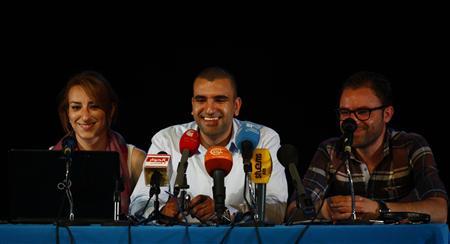Rebel Rises In Tunisia
By Countercurrents.org
04 June, 2013
Countercurrents.org

Mohamed Bennour (C), coordinator of the Tunisia Tamarod (rebel) movement, speaks at a news conference in Tunis July 3, 2013. Credit: Reuters/Zoubeir Souiss
Tunisian opposition activists have launched their own version of Egypt 's Rebel, a movement initiated by youth, whose campaign to remove Morsi from presidency drew millions onto the streets and ultimately overthrew Morsi and Muslim Brotherhood.
A Tunis datelined Reuters report headlined “New Tunisian protest movement takes cue from Egypt ” said on July 3, 2013:
The youthful, little known leaders of Tunisian Tamarod (Rebel) hope to galvanize opposition to their own Islamist-led government which, like Mursi, came to power after an uprising in 2011 that swept an autocratic leader from office.
The report by Tarek Amara said:
Like its Egyptian namesake, the Tunisian group accuses the Islamists of trying to usher in a religious state that smothers personal freedoms and failing to drag the economy out of crisis.
The Tunisian Rebel is planning to call for mass protests after collecting signatures of about 200,000 people opposing the government.
The Tunisian activists hope they can acquire comparable momentum.
Tamarod spokesman Mohamed Bennour said the group aimed to overturn a Constituent Assembly charged with drafting a new constitution, accusing the body of preparing the ground for a religious state. It also wants a new caretaker government.
" Tunisia 's young are following in the footsteps of young Egyptians. We are not satisfied with what is happening in the country, from an attack on freedoms to a bad economic and social situation," Bennour told reporters.
The struggle for power has deepened animosity between Tunisia 's Islamists and liberals since the ousting of Ben Ali in the first Arab Spring uprising.
But the protest group may struggle to have the same impact as Egyptian Tamarud.
Tunisia 's governing Islamist party Ennahda managed to head off growing street protests and appease secular-minded parties by ushering in a coalition government in March that included several independent ministers.
Ennahda has also accepted that sharia (Islamic law) is not mentioned in Tunisia 's new constitution, a demand of secular politicians.
An earlier Reuters report headlined “ Tunisia 's Islamist PM says Egypt scenario unlikely to happen there” said:
A situation like the one in Egypt is unlikely to happen in Tunisia - the cradle of the Arab Spring – Tunisian prime minister Ali Larayedh of the Islamist led-government in Tunis , said on July 1, 2013.
In an interview on France 24, Larayedh, a senior leader of the moderate Islamist Ennahda party, said: "The possibility of an Egypt scenario is unlikely in Tunisia because I have great confidence in the awareness of Tunisians and their ability to measure the potential of their country."
In Tunisia , the divide between secularists and Islamists has widened since the ouster of former president Ben Ali more than two years ago.
The Tunis datelined report by Tarek Amara said:
The role of Islam has grown in Tunisian society and been enshrined on a new constitution, but the divisions are seen as less severe than in Egypt .
Last March, Ennahda party responded to pressure from the secular opposition and accepted the appointment of independent ministers. The opposition has said Ennahda wants to control all aspects of the state.
On July 1, the United Nations said it feared the implications of the Egyptian situation on other countries in the region. "The world is watching Egypt , and the fate of the transition process in Egypt will have a significant impact on the other countries undergoing transition in the region," said Eduardo Del Boy, an assistant U.N. spokesman.
Comments are moderated


